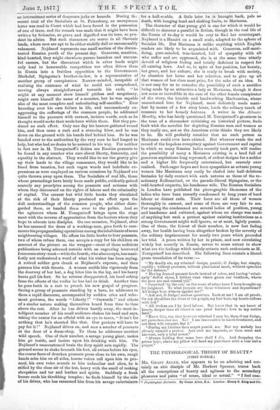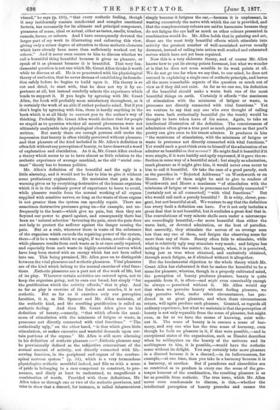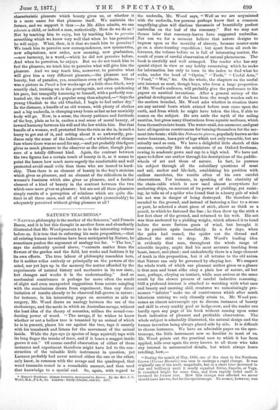THE PHYSIOLOGICAL THEORY OF BEAUTY. 0 [FIRST NOTICE.] Mn. GRANT ALLEN,
who appears to be an admiring and cer- tainly an able disciple of Mr. Herbert Spencer, traces back all the conceptions of beauty and ugliness to the secondary pleasures and pains "of sense, ideal or actual." "I feel con.- Physiological Sathetics. By Grant Allen, B.A. London: Henry S. King and Co.
vinced," he says (p. 193), "that every msthetic feeling, though it may incidentally contain intellectual and complex emotional factors, his necessarily for its ultimate and principal component, pleasures of sense, ideal or actual, either as tastes, smells; touches, sounds, forms, or colours. And I have consequently devoted the larger part of my work to illustrating and enforcing this view, giving only a minor degree of attention to those esthetic elements which have already been more than sufficiently worked out by others." And it never even occurs to him to discuss whether we call a beautiful thing beautiful because it gives us pleasure, or speak of it as pleasant because it is beautiful. That very fun- damental question is not one which Mr. Grant Allen thinks it worth while to discuss at all. He is so penetrated with his physiological theory of aesthetics, that he never dreams of establishing its founda- tion safely before he begins to build upon it. His theory is so out and dried, to start with, that he does not try it by ex- perience at all, but instead carefully selects the experience which tends to support it. If you begin by agreeing with Mr. Grant Allen, the book will probably seem satisfactory throughout, as it is certainly the work of an able if rather pedantic mind. But if you don't begin by agreeing with him, there is hardly anything in the book which is at all likely to convert you to the author's way of thinking. Probably Mr. Grant Allen would declare that for people so stupid as to question whether all mental phenomena were not ultimately analysable into physiological elements, his book is not written. But surely there are enough persons still under the impression that beauty is often vividly perceived without pleasure, and that pleasure of the kind included in Mr. Allen's definition is often felt without any perception of beauty, to have deserved a word of explanation and elucidation. As it is, Mr. Grant Allen evolves a theory which seems to us to have almost as little relation to the aesthetic experience of average mankind, as the old "social con- tract" theory has to human politics.
Mr. Allen's definition of the beautiful and the ugly is a little alarming, and it would not be fair to him to give it without some preliminary explanation. He maintains that pain is the
warning given us by everything destructive of the human organism which it is in the ordinary power of experience to learn to avoid,
while pleasure results from the normal working of all organs supplied with sensitive nerves, so long as the waste of these organs is not greater than the system can speedily repair. There are sometimes destructive processes going on—for example, not un- frequently in the heart—which give no pain, but then they are beyond our power to guard against, and consequently there has been no ' natural selection' favouring the pain, since the pain does not help to protect the sufferer against the danger causing the pain. But as a rale, wherever there is waste of the substance of the organism which exceeds the repairing-power of the system, there—if it be a waste which we might, if we chose, avoid—is pain; while pleasure results from such waste as is at once easily repaired,
and especially from such waste in highly-nourished nerves which have long been stored with an energy which has not been called
into use. This being premised, Mr. Allen goes on to distinguish between the vital pleasures and esthetic pleasures. Vital pleasures are of the kind which belong to the normal exercise of vital func- tions. /Esthetic pleasures are a part not of the work of life, but
of its play. Wherever certain activities are entered upon, not to keep the organism going, not to earn our bread, but simply " for the gratification which the activity affords," that is play. And
so far as play is exercise of the limbs and muscles, it is not esthetic. But so far as it exercises only our perceptive faculties, it is, as Mr. Spencer and Mr. Allen maintain, of the msthetic kind, and the resulting gratification is called an esthetic feeling. And then Mr. Grant Allen gives us his definition of beauty,—namely, "that which affords the maxi- mum of stimulation with the minimum of fatigue or waste, in processes not directly connected with vital functions." " The msthetically ugly," on the other hand, "is that which gives little stimulation, or makes excessive and wasteful demands upon cer- tain portions of the organs." Mr. Allen is still more alarming in his definition of esthetic pleasure :—" /Esthetic pleasure may be provisionally defined as the subjective concomitant of the normal amount of activity, not directly connected with life- serving function, in the peripheral end-organs of the cerebro- spinal nervous system " (p. 34), which is a very tremendous physiologico-esthetic mouthful indeed, and fills us with a sense of pride in belonging to a race competent to construct, to pro- nounce, and dimly at least to understand, so magnificent a combination of words. Provided with these definitions, Mr. Allen takes us through one or two of the msthetic provinces, and tries to show that a discord, for instance, is called inharmonious simply because it fatigues the ear,—because it is unpleasant, in wasting excessively the nerve with which the ear is provided, and that the complementary colours are saidto harmonise because they do not fatigue the eye half as much as other colours presented in combination would do. Mr. Allen holds that in painting and art, those are the most truly beautiful effects which stimulate into activity the greatest number of well-nourished nerves usually dormant, instead of Railing into action well-worked and exhausted nerves which have not yet been repaired.
Now this is a very elaborate theory, and of course Mr. Allen knows how to put its strong points foremost, but what we wonder at is that he does not seem sensible to its weak points at all. We do not go too far when we say that, to our mind, he does not succeed in explaining a single case of esthetic principle, and leaves all the more remarkable aspects of the question as much out of view as if they did not exist. As far as we can see, his definition of the beautiful should make a warm bath one of the most beautiful things on earth. Certainly it affords." the maximum of stimulation with the minimum of fatigue or waste, in processes not directly connected with vital functions." Yet we venture to say that any one who ever thought of calling the warm bath aesthetically beautiful (to 'the touch) would be thought to have taken leave of his senses. Again, to take an intellectual illustration of the definition. The consciousness of admiration often gives a true poet as much pleasure as that poet's poetry can give even to his truest admirer. It produces in him " the maximum of stimulation, with the minimum of fatigue or waste in processes not directly connected with vital functions." Yet would such a poet think even to himself of the admiration of an admirer as beautiful on that account ? He might find it beautiful if it were simple, if it were lucidly and aptly expressed, if it gave the re- flection in some way of a beautiful mind ; but simply as admiration, much pleasure as it might give him, it would never even occur to him to call it beautiful. Or take the case of a good parody, such as the parodies in " Rejected Addresses" on Wordsworth or on Moore. Either of them might be said to give to readers of Wordsworth and Moore a maximum " of stimulation with the minimum of fatigue or waste in processes not directly connected" [certainly not at all connected] "with vital functions." But who would call such a parody beautiful ? It is witty, clever, pun- gent, but not beautiful at all. We venture to say that the definition has every fault a definition can have. For it not only includes a great deal that is not beautiful, but it excludes _a great deal that is. The convolutions of very minute shells seen under a microscope are exceedingly beautiful,—far more beautiful than either the warm bath, or devoted admiration, or the best of parodies. But assuredly, they stimulate the nerves of an average man less than any one of them, and fatigue the observing sense far more than any of them. Beauty often fails to stimulate, while what is relatively ugly may stimulate very much; and fatigue has nothing to do with the matter, the beauty, when, it is perceived, being just as true when obtained, and exclusively obtained, through much fatigue, as if obtained without it altogether.
But the fundamental objection to the whole theory which Mr. Grant Allen has elaborated is that he makes the beautiful to be a name for pleasure, whereas, though in a properly cultivated mind, the perception of beauty produces pleasure, beauty is quite separable from it, is often—and might even conceivably enough
be always — perceived without it. Mr. Allen would say that when we perceive beauty without feeling pleasure, we only perceive what, under other circumstances, has pro- duced in us great pleasure, and when these circumstances return, will again produce such pleasure. Granted, as regards all ordinary experience, but what we maintain is that the perception of beauty is not only separable from the sense of pleasure, but might
even, as far as we have the means of knowing, exist with- out it. The sense of beauty is in essence a sense of har-
mony, and any one who has the true sense of harmony, even though he feels no pleasure in it, if that were possible,—and in exceptional states of the organisation, such as Hamlet describes when he soliloquises on the beauty of the universe and its nothingness to him, it is possible,—would have the aesthetic sense without its delight. You may certainly take more pleasure in a discord because it is a discord,—in its ludicrousness, for example,—at one time, than you take in a harmony because it is a harmony, at another. But if paradoxes and absurdities are so contrived as to produce in every one the sense of the gro- tesque humour of the combination, the resulting pleasure is as far as possible from esthetic. The true issue, which Mr. Allen
never once condescends to discuss, is this,—whether the intellectual perception of beauty precedes and causes the
characteristic pleasure which beauty gives us, or whether it is a mere name for that pleasure itself. We maintain the former, and we support it thus :—As Mr. Allen admits, we can educate a child, or indeed a man, aesthetically. How do we do so ? Not by teaching him to enjoy, but by teaching him to perceive something which we know very well that when he has perceived he will enjoy. What, then, is it that we teach him to perceive ? We teach him to perceive new correspondences, new symmetries, new adaptations, new order, new meaning, new graduation, —new harmony, in a word,—which he did not perceive before. And when he perceives, he enjoys. But we do not teach him to feel the pleasure, we teach him to perceive what will give him the pleasure. And we may teach him, moreover, to perceive what will give him a very different pleasure,—the pleasure not of beauty, but of paradox, yes, sometimes even of ugliness. There was a picture in Punch a few weeks ago of a little shoe-black, very scantily clad, trotting on in the pouring rain, not even quickening his pace, but tranquilly humming to himself, with a perfectly con- tented air, the words of a popular song thus adapted,—" Says the young Obadiah to the old Obadiah, I begin to feel rather dry." In the distance, a bundle of an old woman, with plenty of clothes and a big umbrella, is clumping away home as fast as her unwieldy body will go. Now, in a sense, the cheery patience and fortitude of the boy, plain as he is, excites a real sense of moral beauty, of inward harmony between his will and the law within him. But that bundle of a woman, well protected from the rain as she is, in such a hurry to get out of it, and setting about it so awkwardly, pro- duces only the sense of the ludicrous, —of a whirlwind of clumsy fuss where there was no need for any,—and yet probably this figure gives as much pleasure to the observer as the other, though plea- sure of a totally different kind. Again, the contrast between the two figures has a certain touch of beauty in it, as it seems to point the lesson how much more eagerly the comfortable and well protected avoid small evils than those who are inured to hard- ship. Thus there is an element of beauty in the boy's stoicism which gives us pleasure, and an element of the ridiculous in the woman's fussiness which also gives us pleasure, and a further element of a kind of beauty in the contrast between the two which once more gives us pleasure; but are not all these pleasures simply results of a perception of relations which are quite dis- tinct in all three cases, and all of which might (conceivably) be adequately perceived without giving pleasure at all?




































 Previous page
Previous page